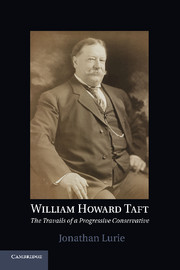Book contents
3 - Roosevelt and Taft in the Philippines, 1900–1904
Published online by Cambridge University Press: 05 December 2011
Summary
To Accept or not to Accept?
Taft later recalled his amazement when in January 1900, President McKinley informed him that he wished to appoint the Ohio jurist to the Philippine Commission, a group of civilians charged with establishing and maintaining civil government, even as the American military found itself fighting a native rebellion in the recently acquired island chain. “He might as well have told me that that he wanted me to take a flying machine.” Taft had expressed little enthusiasm for the Spanish American War, and vaguely recalled that the United States had paid $20 million to Spain in return for taking control of the Philippines. Affairs there did not interest Taft. Indeed, when McKinley asked him to comment on American policy in the Philippines, he promptly disagreed with McKinley’s actions. “I was very much opposed to taking them …,” and indeed “deprecated our taking the Philippines because of the assumption of a burden by us contrary to our traditions[,] and at a time when we had quite enough to do at home.”
McKinley responded with the observation that he had not wanted them either, “but we have got them[,] and in dealing with them I think I can trust the man who didn’t want them better than I can the man who did.” He reiterated his flattering assessment of Taft’s abilities, and added that key members of his administration, including Secretary of War Elihu Root and Secretary of State John Hay, had urged his appointment. Not unreasonably, Taft observed that the president was asking him to give up a life-tenure position in a post that so well-suited him for a very uncertain future. In response, McKinley dangled the prospect of a future Supreme Court appointment before him, and his words concerning Circuit Judge Taft (as reported by Taft to his brothers) are of interest. “If you give up this judicial office at my request[,] you shall not suffer. If I last and the opportunity comes, I shall appoint you…. If I am here, you will be here.” Also present at the meeting, Elihu Root took a different tack, and urged Taft to look at the broader picture.
- Type
- Chapter
- Information
- William Howard TaftThe Travails of a Progressive Conservative, pp. 39 - 63Publisher: Cambridge University PressPrint publication year: 2011

